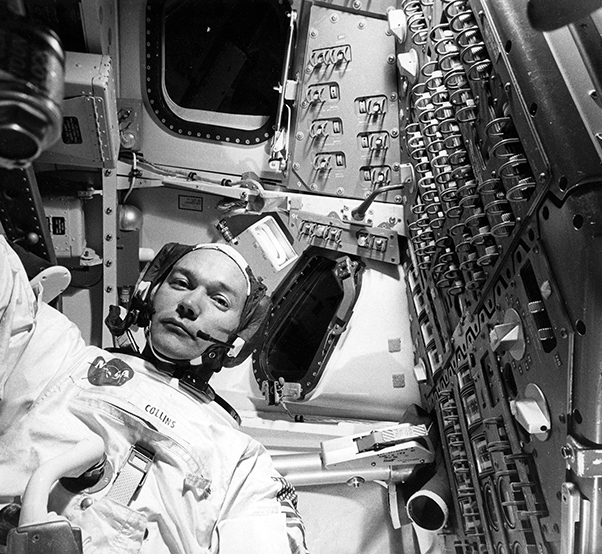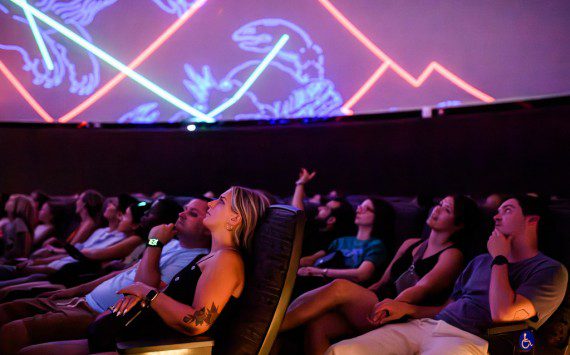By Bob Alvis, special to Aerotech News
Back in the 1970s, Elton John sang a haunting song about a lonely astronaut in a fictional space fantasy, speeding through the universe, surrounded by the science and silence of his lonely journey.
Nobody in the real sense of that song and its words could have ever come closer to that reality than Apollo 11 astronaut Michael Collins.
Michael Collins carried a heavy burden on the Apollo 11 mission and people don’t often give him the credit that he so deserves for the success of that Moon landing. As Collins stated in an interview once, the entire mission relied on a bunch of daisy chain events to go off without a hitch, for there to be a successful outcome. Believe it or not, the crew of Apollo 11 felt they had about a 50-50 chance of making it to the Moon and back. Collins was the pilot of the command module Columbia and responsible for the precision maneuvers required to dock with the lunar module Eagle, which was no easy task. But the real drama for him was the point when that hard dock finally had to be released, and Neil and Buzz floated away to their destiny on the lunar surface below. That destiny is what will define Michael Collins’ life for as long as he lives.
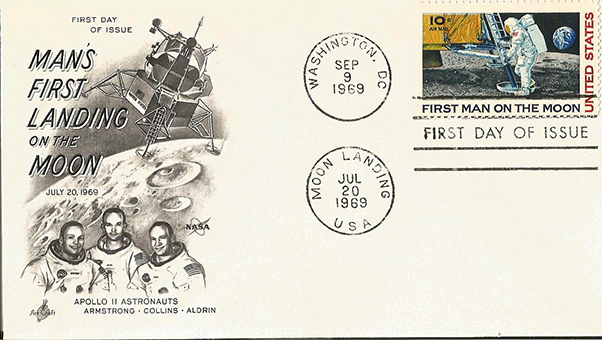
Michael had trained for all possible situations on the mission. The scenario he dreaded most was the one that would have him returning to earth alone, leaving his two fellow astronauts marooned on that lifeless celestial body, or in a low-orbit trajectory that was not high enough for a re-docking of the two craft. As Neil and Buzz began their descent to the surface of the Moon, Michael started on a journey that would parallel that of another individual who faced the unknown alone, with no contact with fellow human beings. As Michael circled to the back side of the Moon, only early aviator and legendary pilot Charles Lindberg knew what he faced, as Michael became the loneliest single human being to be this far from humanity with no contact in the emptiness of space.
If that wasn’t enough, for the next 22 hours Michael flew the command module under the pressure of wondering if he would ever see Neil and Buzz again, and if that lonely trip home that he’d trained for would become a reality. Imagine the talk in that tunnel as the hatch was closed after handshakes and good wishes, and being the one left alone so far from home. Yes, Neil and Buzz were very brave explorers but Michael was also a very brave explorer, with a much different task to perform and a very different form of pressure.
On the back side of the Moon, in a crew compartment not much bigger than a mid-size car interior and the vastness of the universe outside his windows, he went about his tasks in conditions that would have the majority of us fearing the onset of claustrophobia and paranoia. But true to his incredible character and dedication, he kept on task so he could be there to give his shipmates the ride home they were so hoping for, sparing him the unpleasant task of piloting home a very bleak spacecraft and a reception from a nation in mourning.
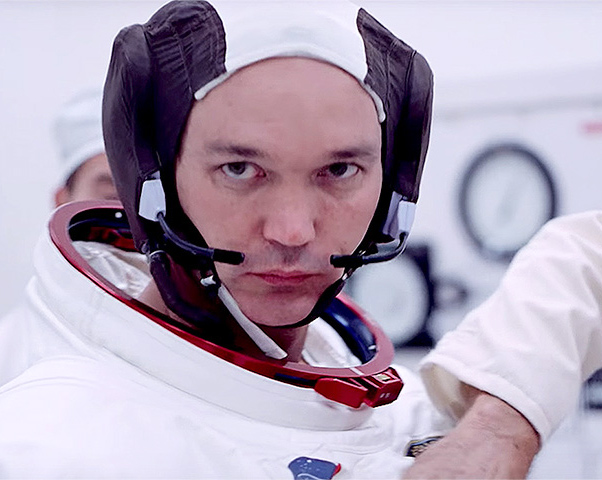
Columbia swept behind the Moon and Collins became Earth’s most distant solo traveler, separated from the rest of humanity by 250,000 miles of space and by the bulk of the Moon, which blocked all radio transmissions to and from Mission Control. He was out of sight and out of contact with his home planet.
“I am now truly alone and absolutely alone from any known life. I am it.” — he wrote in his capsule.
As the hours unfolded, there were a couple of incidents that did have the possibility of bringing an end to the mission but in the end, the “daisy chain” of events that Michael spoke of became a reality. The moment came when two very tired space explorers reunited with a very relieved spacecraft pilot and started the journey home, to a world that would now wake up to the reality of living in a time where mankind had walked on a faraway heavenly body.
Richard Nixon, then U.S. president, had prepared a speech that he would deliver in the event of the Eagle’s engine failing.
“Fate has ordained that the men who went to the Moon to explore in peace will stay on the Moon to rest in peace,” it ran. “These brave men, Neil Armstrong and Edwin Aldrin, know that there is no hope for their recovery. But they also know that there is hope for mankind in their sacrifice.” If the Apollo 11 mission had been a failure, some say the entire program may have been shelved and Michael Collins would have been the face of the mission for all time — an unwanted legacy, for sure. But on the flipside, with the mission’s success Collins became the missing astronaut, as his two famous crewmates became the face of the mission that we celebrate this month. When people are asked about famous space explorers, of course Neil and Buzz are usually listed as one and two, but Michael is somewhere outside the top ten on most lists. Asked about this, Michael, being the very humble man he is, says that really doesn’t bother him. When asked about those lonely hours around the Moon he just replies, “Looking back now, deep down inside I was a very happy man.”
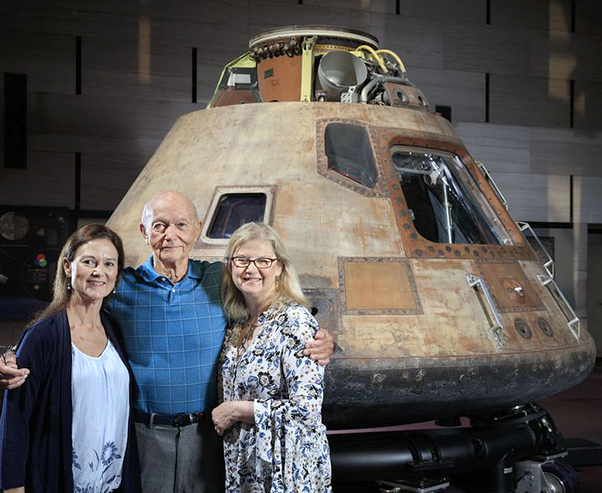
Michael Collins, space explorer, had many hours training and serving here in our Antelope Valley at Edwards, and also as an Air Force pilot at George AFB in Victorville. He is one of the very few Apollo astronauts who are still around to share this amazing history on the 50th anniversary of the Apollo 11 mission. We honor Neil, Buzz and Michael for bringing a special pride to our home here in America and hope and pray that someday our missions to far off planets will once again inspire future generations to reach for the stars.
By the way, after the mission and a passage of time, an envelope arrived at Michaels’s home. Inside was a penned letter from none other than Charles Lindberg that noted the unique aspect of isolation the two men shared, which I referred to in this story.
“Rocket man, burning out his fuse up here alone” was the chorus line from the Elton John song, and forever more I will always think of Michael Collins doing just that.
Until next time, Bob out! And thank God for our brave astronauts who inspire us every day.
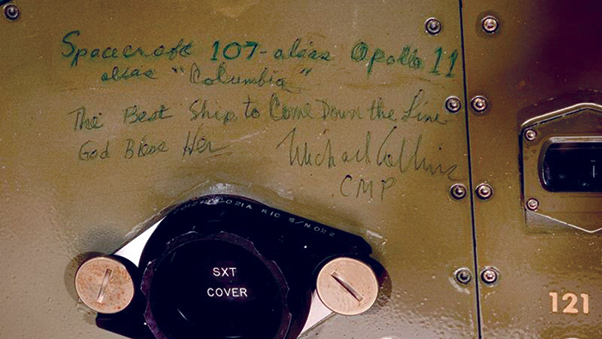
See Also:
Moon landing culmination of years of work
President Kennedy issued the challenge
Fifty years ago: One ‘giant leap for mankind’
July 20, 1969: One giant leap for mankind
Apollo 11 at 50: Celebrating first steps on another world
Apollo 11’s ‘amiable strangers’ – Armstrong, Aldrin and Collins
DOD played significant role in lead-up to Apollo 11 Moon mission
Apollo 11 astronaut was also an Air Force general
Air Force service prepared Buzz Aldrin for Apollo 11 Moon landing
Apollo 11’s return to Earth rooted in aeronautics research
Johnson Space Center Oral History Project – Neil A. Armstrong
 DON'T FORGET TO SIGN UP
DON'T FORGET TO SIGN UP
Get Breaking Aerospace News Sent To Your Inbox! We Never Spam
By submitting this form, you are consenting to receive marketing emails from: . You can revoke your consent to receive emails at any time by using the SafeUnsubscribe® link, found at the bottom of every email. Emails are serviced by Constant Contact






